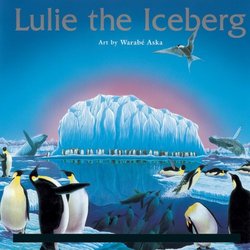Nice eco-fable for kids of all ages.
Bob Zeidler | Charlton, MA United States | 12/02/2002
(5 out of 5 stars)
"Very little of what we call "classical music" has been specially composed for children (with narration addressed specifically to them), either for didactic reasons or for plain, simple enjoyment. In the former category (to familiarize children with the instruments of the orchestra) are Benjamin Britten's "Young Person's Guide to the Orchestra" and Camille Saint-Saëns's "Carnival of the Animals" (which, strictly speaking, had been an "adult" conceit on Saint-Saëns's part). In the latter category are such classics as Francis Poulenc's "Babar the Elephant" and Sergei Prokofiev's "Peter and the Wolf." But the list is abysmally small.
So it's nice to welcome an addition to this regrettably short list, "Lulie the Iceberg." Based on a story written by Her Imperial Highness, Princess Hisako of Takamado, and set to original music by Jeffrey Stock, this is a musical tale, with narration, of Lulie, an Arctic iceberg that calves (breaks away) from its glacier, then to drift down the western Atlantic to ultimately arrive at Antarctica, learning lessons in life and the environment along the way so that it can ultimately become one of the "Wise Elders" of Antarctica.
Were it to be treated with a heavy hand, this fable could easily be overly didactic, and lose the interest of its targeted audience. Fortunately, it is not treated with a heavy hand, and the narration, by Sam Waterston, strikes this "non-kid" as "about perfect": the points are made gently, the narration doesn't overwhelm the music, and the music itself is splendid.
Nicely scored for three instrumental soloists (Yo-Yo Ma - truly virtuosic as always - on cello as Lulie, Paul Winter on soprano saxophone as Kiki, an Arctic tern befriended by Lulie, and Pamela Frank on violin as both puffin and penguin), full orchestra, and chorus (to represent the Wise Elders), the music is overtly Romantic: very lush; totally tonal; absolutely nothing that would frighten children away from classical music if this were to be an "early exposure" for them.
All three soloists are in excellent form here. Pamela Frank and Yo-Yo Ma are of course no strangers to Carnegie Hall. It's good to see (and hear) that Paul Winter is now added to that list; the choice of his instrument for depicting Kiki is an interesting one. And I'm sure he followed the directions for getting to Carnegie Hall: "Practice, practice." The Orchestra of St. Luke's (here under the direction of Derrick Inouye) is of course well enough known in its own right. And the Betty Baisch Choral Associates provide fine support, particulary for the Greenlandic poem "Meerara, marluliara" that Stock wrote for the work. The work, to the best of my recollection, was performed only once, and this live recording captures the performance perfectly, with virtually no audience noise (and I'm sure the audience had many children in it).
I'm not quite yet at the "Chicken Little" stage of classical music alarmism, and the need for parents to see to it that their children get something better than a steady diet of oxymoronic "pop culture." But the situation could certainly be better than it is. This release will surely help. Just file it with the Britten, Poulenc, Prokofiev and Saint-Saëns classics noted above. And play all of them frequently for your own children.
Bob Zeidler"
A charming tale set to marvelous music
D. Sanderson | 06/28/2001
(4 out of 5 stars)
"Expertly played by the soloists & orchestra, this charming children's tale is set to listenable, affective music. My children love to listen to the CD while following along in the book. The artwork is bright and engaging. True, some of the story text has been changed for the musical work, but that does not detract from the telling. Yo-Yo Ma is especially outstanding, as always. Sam Waterston reads like a dad. Audience background clutter is minimal, suprising for a live recording where children may have been in abundance in the audience."


 Track Listings (12) - Disc #1
Track Listings (12) - Disc #1